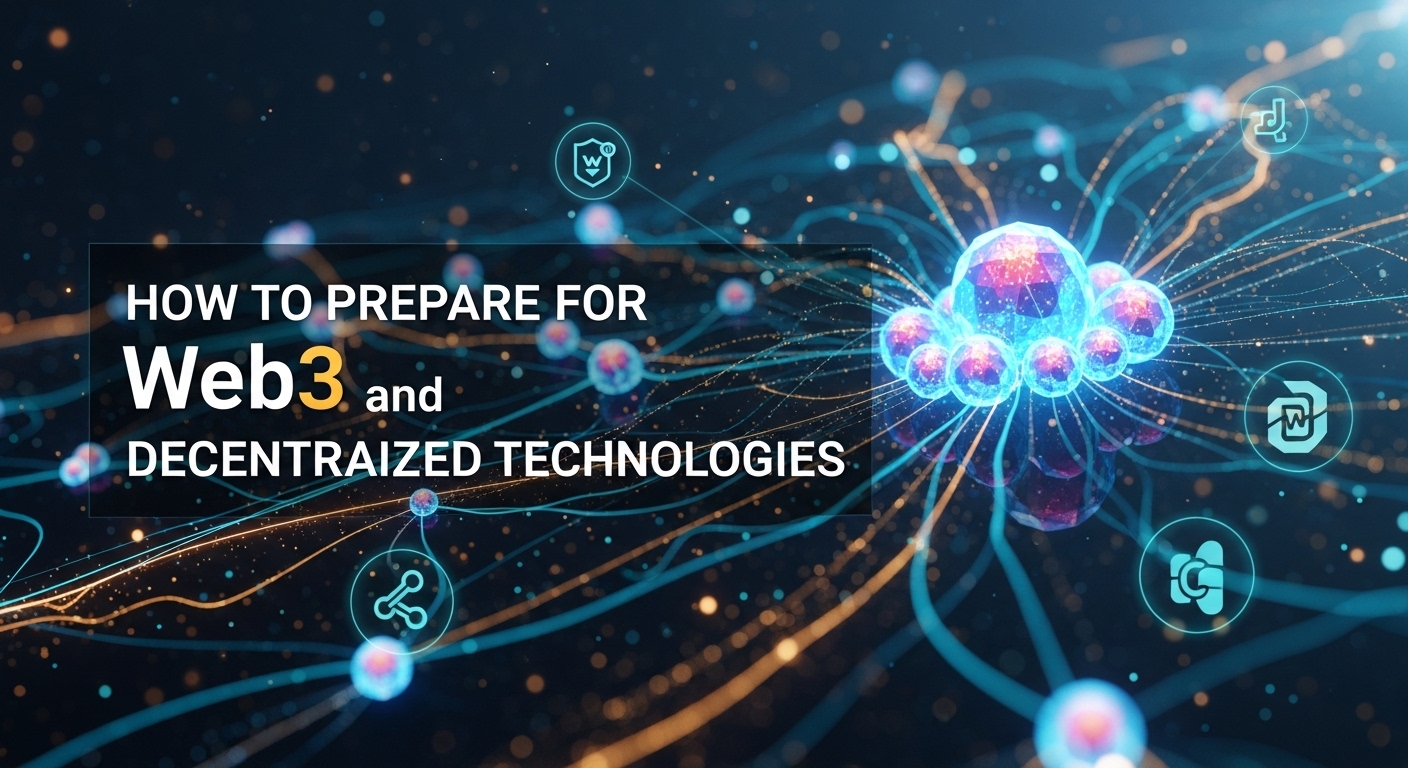The digital landscape is rapidly evolving, and knowing how to prepare for web3 has become crucial for professionals, entrepreneurs, and tech enthusiasts alike. Web3 represents a paradigm shift toward a more decentralized internet, built on blockchain technology and powered by community governance. As traditional tech giants face increasing scrutiny and users demand more control over their digital lives, decentralized technologies are emerging as the foundation for the next generation of the internet.
Before we explore the roadmap to web3 readiness, let me ask you a fundamental question: What aspects of decentralized technology intrigue you most? Is it the potential for financial freedom through DeFi, the creative possibilities of NFTs, or perhaps the governance models of DAOs? Understanding your specific interests will help you focus your learning journey more effectively.
Understanding the Web3 Ecosystem
To effectively prepare for web3, you must first grasp what makes this technology revolutionary. Web3 isn’t just about cryptocurrencies or NFTs—it’s about reimagining how we interact with digital systems, store data, and conduct transactions online.
What Makes Web3 Different?
Traditional web applications (Web2) rely on centralized servers controlled by companies. In contrast, Web3 applications run on decentralized networks, typically built on blockchain technology. This fundamental shift means:
- Data ownership returns to users instead of being controlled by platforms
- Transactions occur peer-to-peer without intermediaries
- Governance happens through community consensus rather than corporate decisions
- Value creation is distributed among network participants
Think about this: When you post content on traditional social media, who truly owns that content? In Web3, the answer changes dramatically.
Essential Skills for Web3 Success
1. Technical Foundations
To prepare for web3 effectively, you’ll need a solid technical foundation. Here’s a progressive skill-building approach:
Programming Languages to Master:
- Solidity: The primary language for Ethereum smart contracts
- JavaScript/TypeScript: Essential for building decentralized applications (dApps)
- Python: Valuable for blockchain data analysis and automation
- Rust: Growing in popularity for high-performance blockchain projects
Development Frameworks:
- Hardhat or Truffle: For smart contract development and testing
- React/Next.js: For building user interfaces
- Web3.js or Ethers.js: For blockchain interaction
- IPFS: For decentralized file storage
2. Blockchain Fundamentals
Understanding blockchain technology is crucial when you prepare for web3. Can you explain how a blockchain maintains consensus without a central authority? If not, here are the core concepts to master:
Concept | Description | Why It Matters |
Consensus Mechanisms | How networks agree on transaction validity | Determines security and energy efficiency |
Smart Contracts | Self-executing contracts with coded terms | Enable trustless automation |
Cryptographic Hashing | Secure data verification methods | Ensures data integrity |
Public/Private Keys | Digital identity and security system | Controls asset ownership |
3. DeFi and Financial Protocols
Decentralized Finance (DeFi) represents one of the most mature Web3 sectors. To prepare for web3 careers in this space, familiarize yourself with:
- Automated Market Makers (AMMs) like Uniswap and SushiSwap
- Lending protocols such as Aave and Compound
- Yield farming and liquidity mining strategies
- Risk assessment in decentralized protocols
Consider this: How would you design a system where strangers can lend money to each other without a bank? This type of thinking is essential in DeFi.
Building Your Web3 Portfolio
Start with Hands-On Projects
The best way to prepare for web3 is through practical experience. Begin with these progressive projects:
Beginner Level:
- Deploy a simple smart contract on a testnet
- Create a basic NFT collection
- Build a decentralized voting application
Intermediate Level:
- Develop a DeFi protocol with lending/borrowing features
- Create a DAO governance system
- Build a cross-chain bridge application
Advanced Level:
- Design a Layer 2 scaling solution
- Develop a complex DeFi protocol with multiple token pairs
- Create a decentralized identity management system
What type of project excites you most? Your passion will drive your learning and help you stand out in the Web3 job market.
Contributing to Open Source
Many successful Web3 professionals built their reputations through open-source contributions. Consider contributing to projects like:
- Ethereum Foundation research and development
- OpenZeppelin security frameworks
- DeFi protocols and their documentation
- Web3 educational resources and tutorials
Navigating the Web3 Job Market
High-Demand Roles
As you prepare for web3, consider these growing career paths:
Technical Roles:
- Smart Contract Developer
- Blockchain Protocol Engineer
- DeFi Quantitative Analyst
- Web3 Security Auditor
- DevOps Engineer for Blockchain Infrastructure
Non-Technical Roles:
- Tokenomics Designer
- Community Manager
- Business Development in Web3
- Legal and Compliance Specialist
- Product Manager for dApps
Emerging Roles:
- DAO Operations Manager
- NFT Strategy Consultant
- Metaverse Experience Designer
- Web3 UX/UI Specialist
Which of these roles aligns with your current skills and interests? Understanding this will help you focus your preparation efforts.
Building Your Professional Network
The Web3 community is highly collaborative. To prepare for web3 success, actively engage with:
- Twitter/X communities following key Web3 builders and thought leaders
- Discord servers of major protocols and projects
- Ethereum Global hackathons and local blockchain meetups
- GitHub repositories where you can contribute and learn
- Developer DAO and similar professional organizations
Staying Current with Rapid Evolution
Essential Learning Resources
Web3 technology evolves rapidly, making continuous learning crucial. Bookmark these resources:
Technical Documentation:
News and Analysis:
- The Defiant for DeFi news
- Bankless for Web3 strategy
- Messari for protocol research
Educational Platforms:
- Buildspace for hands-on Web3 projects
- Alchemy University for blockchain development
- Questbook for decentralized learning
How do you currently stay updated with technology trends? Applying similar strategies to Web3 will accelerate your preparation.
Understanding Regulatory Landscape
As governments worldwide develop Web3 regulations, staying informed becomes crucial when you prepare for web3. Monitor developments in:
- Securities regulations affecting token launches
- Tax implications of DeFi activities
- Privacy regulations impacting blockchain applications
- Cross-border compliance for global protocols
Risk Management and Security
Smart Contract Security
Security vulnerabilities can be catastrophic in Web3. Essential security practices include:
Code Review Practices:
- Formal verification of critical functions
- Multi-signature wallet implementation
- Time-locked administrative functions
- Regular security audits by reputable firms
Common Vulnerabilities to Understand:
- Reentrancy attacks
- Integer overflow/underflow
- Front-running and MEV exploitation
- Flash loan attacks
Can you identify potential attack vectors in a smart contract? This skill is invaluable whether you’re building or auditing Web3 applications.
Future-Proofing Your Web3 Skills
Emerging Technologies to Watch
As you prepare for web3, consider these evolving areas:
Layer 2 Solutions:
- Optimistic Rollups (Arbitrum, Optimism)
- ZK-Rollups (Polygon zkEVM, StarkNet)
- State channels and sidechains
Interoperability Protocols:
- Cross-chain bridges
- Multi-chain applications
- Universal wallet standards
Privacy-Preserving Technologies:
- Zero-knowledge proofs
- Confidential computing
- Decentralized identity solutions
Which of these technologies do you think will have the biggest impact on Web3’s future? Your answer might guide your specialization choice.
Taking Action: Your Web3 Preparation Roadmap
30-60-90 Day Plan
Days 1-30: Foundation Building
- Complete a blockchain fundamentals course
- Set up development environment (MetaMask, Remix IDE)
- Deploy your first smart contract on a testnet
- Join 3-5 Web3 communities
Days 31-60: Skill Development
- Build your first dApp with a simple user interface
- Contribute to an open-source Web3 project
- Attend a virtual blockchain conference or hackathon
- Start following Web3 job boards and opportunities
Days 61-90: Portfolio and Network Building
- Launch a personal Web3 project showcasing your skills
- Write technical blog posts about your learning journey
- Connect with 10+ Web3 professionals on LinkedIn
- Apply for Web3 internships or entry-level positions
Conclusion
Learning how to prepare for web3 requires dedication, continuous learning, and hands-on practice. The decentralized web represents more than just a technological shift—it’s a fundamental reimagining of how we interact with digital systems and each other online.
Success in Web3 comes from combining technical skills with deep understanding of decentralized principles, community engagement, and relentless curiosity about emerging technologies. Whether you’re a developer looking to build the next DeFi protocol or a business professional seeking to understand tokenomics, the key is to start building and contributing today.
The Web3 revolution is still in its early stages, presenting unprecedented opportunities for those willing to prepare for web3 thoughtfully and systematically. What aspect of Web3 will you explore first? Remember, every expert was once a beginner, your Web3 journey starts with that first smart contract deployment or community contribution.
The future of the internet is being built today. By following this preparation guide, you’ll position yourself at the forefront of this technological transformation, ready to contribute to and benefit from the decentralized web’s enormous potential.











